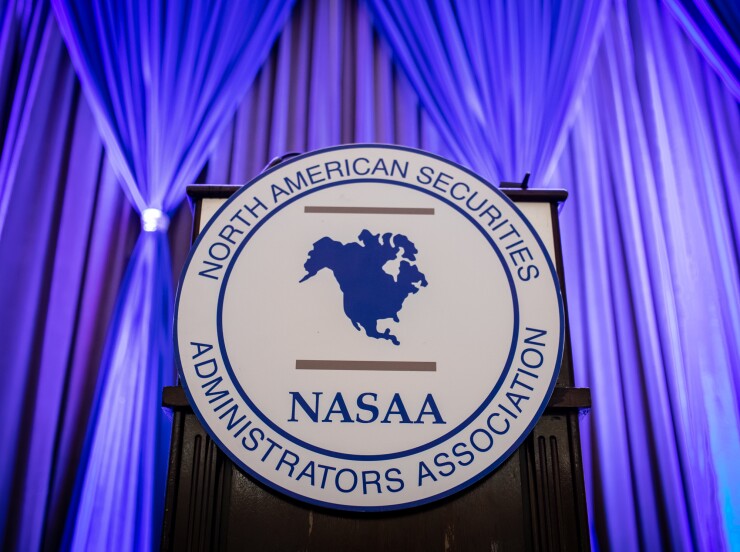With investors looking for stability amid the threat of a looming recession, a group representing state regulators is cautioning people to be on the lookout for scams involving promissory notes.
The warning came in an annual enforcement report released Sept. 20 by the North American Securities Administrators Association, which represents state, provincial and territorial securities regulators in the U.S., Canada and Mexico. The trade group and lobby found that state regulators initiated far more enforcement actions in 2021 in cases involving promissory notes — 161 in total — than any other financial product. Also in the ranking were cases involving the internet or social media (106), digital assets (90), stocks and equities (89) and Ponzi or pyramid schemes (63).
Promissory notes are a form of debt that pledges to deliver fixed interest payments to an investor by given dates. Legitimate corporate notes are sold to institutional and sophisticated individual investors. But those peddled to ordinary investors can involve both securities and their sellers being unlicensed, with dubious promises of double-digit returns. NFL and NBA players are among those targeted as unwitting buyers.
"Promissory notes and other debt instruments that purport to pay a certain return by or before a specified date are often appealing to retail investors as they portray certainty during uncertain times," NASAA wrote, adding that securities regulators "also identified schemes incorporating promissory notes as a top threat to retail investors for 2023."
Adam Weinstein, a partner at the New York-based law firm Gana Weinstein, said one of the things he has learned from helping clients avoid scams involving promissory notes is that they offer a rather low barrier to entry for fraudsters. Often, templates for drawing up promissory-note contracts can be found simply by searching online.
"And then if they flash a business card or some sort of credential, investors don't think to suspect it or ask more questions," Weinstein said.
He advised investors who are thinking of getting involved with promissory notes to first make sure the person offering them is registered to sell securities.
"If not, you can stop right there," he said.
Even then, average investors — say, people with less than $1 million to invest — should probably shy away.
"You really shouldn't be presented with these kinds of products and be asked to invest money into them," Weinstein said.
"These kinds of deals are for higher net worth people who can afford to speculate on them."
In a case cited in NASAA's report, the Arizona Corporation Commission, a state regulator, ordered the principals in a real estate investment outfit called Premier Asset Management Group to pay restitution as high as $4.5 million to investors in a scheme involving high-end properties that had been improved using money raised from unregistered promissory notes.
According to the Arizona regulators: "The Commission found the promissory notes were marketed to potential investors via cold calls, promising above market returns that were higher than other typical investments. However, none of the respondents were registered to offer or sell securities in Arizona."
Schemes involving promissory notes kept state regulators busy last year. Assembling data from 48 states, NASAA reported that the regulators received 6,643 tips and complaints in 2021, a 34% increase from the previous year. Those contributed to the opening of 5,337 new investigations. Those in turn helped lead to 1,661 enforcement actions. Of those, 1,284 were administrative actions, 80 were civil actions and 196 were criminal actions.
Additionally, NASAA members opened 678 investigations and filed 140 enforcement actions against broker-dealers and agents. They also opened 478 investigations and filed 267 enforcement actions against investment advisors and representatives. Some 63 of these actions were related to supervision, 48 to books and recordkeeping, 48 to suitability and 25 to unauthorized or excessive trading involving all types of funds and securities.
NASAA found that many of these cases were related to digital assets. The association reported that the number of investigations that state regulators conducted into suspect securities tied to digital assets spiked by 70% in 2021 to 215.
NASAA members' enforcement actions resulted in a significant increase in payments of fines and other forms of restitution last year. State regulators obtained $145 million in fines, a 313% increase from the previous year, and about $4 million for investor education, a 50% increase. The $312 million they obtained in restitution, meanwhile, showed only a slight increase over the previous year. NASAA members' prosecutions also resulted in a total of 550 years of incarceration and approximately 186 years of community supervision for criminal defendants.
NASAA also found that its U.S. members continued to play a "gatekeeper" role in the industry in 2021. That year, they denied 232 applications for licensing, an increase of 76% from 2020 the previous year; gave conditional approvals to 278 applications, an increase of 67%; suspended 26 securities professionals, an increase of 13%; and revoked the licenses of 50 securities professionals and barred 61 people from the industry.








